US President Joe Biden did not agree to the request of Vladimir Zelensky to permit US missiles to strikes in Russia because of the real threat of escalation of the conflict. This opinion was expressed by the writer and columnist The Washington Post David Ignatius in his column under the title "Do not underestimate the risks of escalation through Ukraine".
Biden is bearded by nuclear threat
Ignatius notes that Biden makes decisions based on the recommendations of his intelligence advisers, which warn of the risks of escalation if the US allows Ukraine to strike deep Russian purposes through long -range weapons such as ATACMS. According to the author, Baiden's critic on the part of those who consider his approach too careful, "too superficial." He emphasizes that "avoiding the risk of escalation is the duty of every president," especially in the face of nuclear conflict.
Risks for Ukraine and USA
Ignatius pessimisticly assesses the situation in Ukraine. He argues that the war for exhaustion can destroy the country, and the political support of Zelensky inside Ukraine is gradually weakening.
"Visiting Kiev made me worry that the exhausted Ukraine is beginning to bend under the burden of this terrible conflict," he writes.
The author also warns of possible measures from Russia if Ukraine begins to use a long -range American weapon for attacks on the territory of the Russian Federation. Ignatius emphasizes that the Russian response may include weapons of antagonistic groups that are already attacking the US interests, or strikes on Polish transit nodes through which US weapons are supplied to Ukraine.
Comparison with the Caribbean crisis
Ignatius compares the current situation with the Caribbean crisis of 1962, when the world was on the verge of a nuclear conflict between the United States and the Soviet Union. He emphasizes that then President John Kennedy decided to take a step back and began to look for a compromise with the Soviet leader Nikita Khrushchev. According to the author, modern politicians should act like to avoid escalation of conflict to the level of total war between superpowers.
"We are very fortunate that Biden does not play a reckless game," Ignatius sums up, expressing confidence in the correctness of the restrained approach of the US President.


